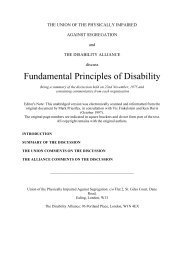Global-Report-Living-Colour-dr2-2
Global-Report-Living-Colour-dr2-2
Global-Report-Living-Colour-dr2-2
You also want an ePaper? Increase the reach of your titles
YUMPU automatically turns print PDFs into web optimized ePapers that Google loves.
Inclusive Communities = Stronger Communities<br />
GLOBAL REPORT ON ARTICLE 19: THE RIGHT TO LIVE AND BE INCLUDED IN THE COMMUNITY<br />
115<br />
Table 10: Second Order Deinstitutionalization<br />
SECOND ORDER DEINSTITUTIONALIZATION<br />
Steven M. Eidelman<br />
H. Rodney Sharp Professor of Human Services Policy and Leadership<br />
Over the past six decades it has been family run organizations that have led the way in the<br />
transformation of systems of support for people with intellectual disabilities, from large custodial<br />
institutions to a life in the community. In the 1960’s and 1970’s, the early days of the movement<br />
towards community based supports, families who were struggling without any services, providing care<br />
24 hours a day, were frequently the first to open programmes in community settings for their sons and<br />
daughters. Most often it was a programme that provided something to do during the day, both for<br />
children who did not have the right to education and for adults. Later it was group homes. Those<br />
family run organizations applied what was known at the time, which mimicked the model of care that<br />
existed at that time – facility based services, but on a much smaller scale. As families and advocates<br />
worked to get people out of institutions, these models became the foundation for the service system.<br />
These services changed how people in institutions lived and provided relief for families who were<br />
growing tired and wanted permanency for the future. While those changes were more than a change<br />
in real estate and geography and were a considerable improvement from the institution, they lacked an<br />
affirmative philosophy of person centeredness, self-determination, inclusion and full participation in the<br />
life and fabric of the community. While that was certainly not the intention, in all too many instances it<br />
has been the result.<br />
Now, in light of the CRPD and the promises it puts forth about community living and supporting<br />
families, we must prepare for Second Order Deinstitutionalization: The Remodeling or Transformation<br />
of Existing Community Services, including traditional building-based day supports and many group<br />
homes.<br />
What is Second Order Deinstitutionalization? It is the remodeling or transformation of existing<br />
community services. It is also difficult and important work. Many of the community programmes<br />
developed in the past as alternatives to institutions are now the very programmes which must change.<br />
Many of those programmes were developed by people who remain in leadership roles in family based<br />
organizations and are invested in the programmes they helped to create. We have learned that physical<br />
presence in the community does not necessarily assure integration and inclusion. While many<br />
community services remain traditional, based on what we knew how to do in years past, we also see<br />
examples of programmes that have learned how to include people with intellectual disabilities in both<br />
organizational decision making as well as having them self-direct and choose their own supports and<br />
services. We see programmes that support people living how they want, and with whom they want.<br />
We see programmes supporting people to volunteer in their communities, gain jobs in the main<br />
economy of their community and even in the creation of small businesses.<br />
And all too often, programmes located nearby those fully including people with intellectual disabilities<br />
are segregating and isolating people with intellectual disabilities. There is expertise, globally, in how to



